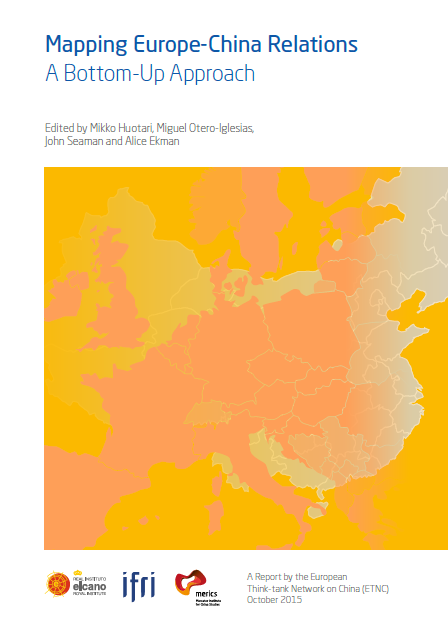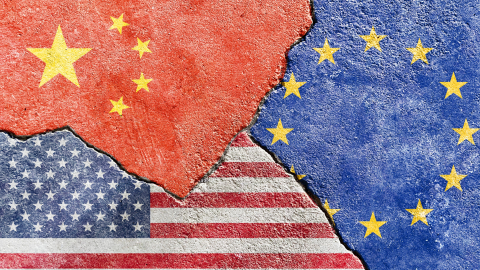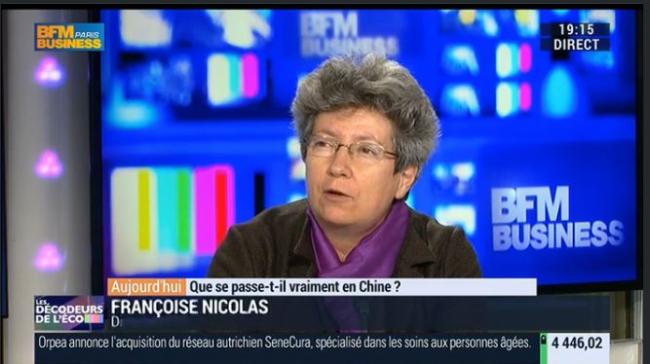

Devaluation of the Yuan: Claude Meyer answers Yves Bourdillon
Is the sudden devaluation of the Yuan a sign of some form of panic from Beijing following the slowed growth of the Chinese economy?
Does this decision create deflationary risks for the global economy?
What prospects for the Yuan’s international status?


Understanding China’s Financial Expansion
In this interview, Claude Meyer underlines the three major vulnerabilities of the Chinese economy, and describes the investments China has made since the early 2000’s to address them.


L'empire de la classe du milieu
Apparue en même temps que le miracle économique, la population des couches moyennes incarne un pays en pleine mutation : confort matériel, meilleure éducation, ouverture sur le monde... mais aussi rupture avec les valeurs traditionnelles.


China looking to learn from France about Africa
Trade is the focus of a three-day visit to France that Chinese Prime Minister Li Keqiang started on Tuesday. Beyond deals with French companies, China and France are expected to sign an agreement on joint infrastructure projects in Asia and Africa.

Chine/Corée du Sud/Japon: un passé qui ne passe pas
Cet été marque le 70ème anniversaire de la fin de la deuxième guerre mondiale avec le largage des bombes atomiques sur Hiroshima et Nagasaki en Août 1945. Alors que les relations entre la Chine et la Corée du Sud sont au beau fixe, Pékin et Séoul entretiennent des rapports tendus avec Tokyo.

Le changement politique tente peu la classe moyenne chinoise
Michel de Grandi présente les conclusions de l'étude d'Alice Ekman sur les classes moyennes chinoises.
What is China's vision in shaping cooperative frameworks? Interview with Richard W.X. Hu
Richard W.X. Hu, Professor in the Department of Politics and Public Administration at the University of Hong Kong, analyzed China's role in the regional economic integration process.
- What is China’s vision in shaping cooperative frameworks?
- What is China’s rationale behind setting up the Asian Infrastructure Investment Bank?
- What is your prognosis for the future of a China-Japan-Korea cooperative framework?
Click here to read the program of the conference.




Que se passe-t-il vraiment en Chine ?
L'évolution de l'économie chinoise a été décryptée par Benaouda Abdeddaïm, éditorialiste économique à BFM Business, Chunyan Li, présidente de FEIDA Consulting & Training auteur de "Réussir sur le marché chinois: 100 dirigeants révèlent les secrets du casse-tête chinois", Jean-Paul Tchang, consultant spécialiste de la Chine, Françoise Nicolas, directrice du Centre d'Asie à l'Ifri, et économiste, et Qunkai Liu, ingénieur télécom. - Les Décodeurs de l'éco, du 20 janvier, présenté par Fabrice Lundy, sur BFM Business.
Coal and Climate Change: the "Chinese Way" ?
This article, issued after Asia Center and ASEF's international conference on coal issues in China (26th and 27th of June 2014 in Beijing), tackles the challenges the country is facing in restructuring its coal industry, in a context of severe and recurrent air, soil and water pollution outbursts.

Mapping Europe-China Relations: A Bottom-Up Approach. A Report of the European Think-tank Network on China ETNC, October 2015
As China’s rise continues to shape and shake the course of international affairs, and Europe enters a new chapter in its collective history, Europe-China relations are becoming more relevant, but also much more complex.
China’s Emerging Middle Class: What Political Impact?
This research paper argues that, contrary to what is often believed, most of the Chinese middle class appears to be politically conservative, and may not challenge the current political order as much as is expected, for several reasons; first of all, because of its strong connection to the Communist Party of China and the civil service in broader terms. Nonetheless, Chinese middle households are increasingly voicing their concern about a set of issues directly affecting them, such as pollution, either in the street or online.
Nationalism in China and Japan and Implications for Bilateral Relations
Nationalism appears to be an important part of the growing frictions between China and Japan.
In Japan, the return to power of Shinzo Abe as prime minister, and the historic breakthrough of an extreme right-wing party onto the political scene reinforce the view that there has been a clear shift to the right. Public opinion is today also more realistic about direct security threats to Japan.
The Umbrella Revolution and the Future of China-Hong Kong Relations
In this article, Willy Lam argues that the events of recent weeks represent a turning point in China-Hong Kong relations. The author analyses the multiple facets of the movement in Hong Kong and Beijing's response.
The Distinctive Features of China's Middle Classes
This study seeks to lay the foundations for a better understanding of the Chinese middle classes. It goes beyond the traditional classification by revenue and identifies the distinctive features of China’s middle classes by taking into account relevant historical events, current sociopolitical and economic contexts, and key expectations of the population.
Urbanization and Mobility in China: New Patterns and Intermodal Connections
Chinese cities are getting bigger and are also growing into each other. To ensure that the rapidly increasing number of urban residents have access to adequate transportation not only requires increased investment in transportation, but also careful deliberation to allow an optimal tradeoff between different modes of transport as well as a coordinated approach to land development and transport development.
China's Growing Natural Gas Insecurity and the Potential of Chinese Shale Gas
China is poised for a dramatic increase in its demand for natural gas. As total energy demand has risen to record levels in the last five years, China has found itself in an increasingly difficult bind: the social and environmental burden from coal is becoming too heavy to bear and a growing dependence on foreign oil is becoming strategically more risky with the passage of time.
Japan and the South China Sea: Forging Strategic Partnerships in a Divided Region
In the midst of growing tensions with China, Japan is deepening its strategic engagement in Southeast Asia. Preserving stability in the South China Sea, which is threatened by renewed frictions around contested territories, is a vital interest for sea lane-dependent Japan. Moreover, Tokyo considers Southeast Asian countries as crucial partners in balancing against an increasingly powerful and more assertive China.
China's Two-Track Foreign Policy: From Ambiguous to Clear-Cut Positions
This analysis examines the current ambiguities, priorities and approaches of Chinese foreign policy from a practitioner’s perspective, taking into account experiences of Beijing-based diplomats (interviews conducted in 2011 and 2012), in addition to recent Chinese foreign policy positions and official communications.
It leads to the following conclusions:
Support independent French research
Ifri, a foundation recognized as being of public utility, relies largely on private donors – companies and individuals – to guarantee its sustainability and intellectual independence. Through their funding, donors help maintain the Institute's position among the world's leading think tanks. By benefiting from an internationally recognized network and expertise, donors refine their understanding of geopolitical risk and its consequences on global politics and the economy. In 2024, Ifri will support more than 70 French and foreign companies and organizations.















